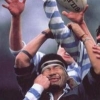Lire l 'article de J Beattie sur l 'ambiance Altrad ...le SC....les Lamborguini sur le parking avec la montre au barcelet aux couleurs des bagnolles...etc....
Les Lamborguinis ont remplacé les chamelles ....mais pas la grotte d'Alibaba....et la naïveté évidente du SC ....et des présidents de top 14 à l 'égo surdimensionné qui n 'entravent rien au rugby....
Ce que l 'on sait , ce dont on se doute , ce que l 'on ne sait pas...mais à l 'arrivée c'est à l 'image du conflit d'intérêts Altrad.. Groupe Altrad....FFR ...de Laporte et de ses tonton flingueurs....rien ne changera le pognon gagne toujours et parvient même à acheter la dignité des gens ......
L'affaire Azéma n 'est rien de plus ou de moins qu'une des illustrations parmi d'autres de toutes ces pratiques , où seul l 'argent gagne toujours et l 'arrivée du professionnalisme ne peut qu'amplifier ces dérives inéluctables !
Notre pauvre Franck qqpart est la victime humaine de ce système où i s'est sans doute fait piéger en voulant jouer ses cartes et son avenir.....mais l 'histoire n 'est sans doute qu'en stand bye à l 'instar de l 'affaire Goosen avec revirement à venir pour éviter à Altrad de faire le chèque....on en reparlera dans qqs mois , vous verrez !
En anglais, désolé, c'est pris sur un site payant que j'ai pu récupéré par un abonnement qui donne droit à la gratuité sur d'autres sites.
You might think that a Super League concept, the like of which was launched so bombastically and beaten into retreat so savagely in the footballing world, could never emerge in rugby. You might think that our sport is too pure and honourable to be tainted in this way. You might think that money could never be allowed to warp and sour it so flagrantly. You might just be wrong.
Rugby needs investment now, perhaps more than ever, but if we can learn anything from the spectacularly despised and shoddily announced ESL, it is that we should be careful whose cash we take, and to whom we cede control.
Look at France, where I spent eight years playing and where I still live today. The presidents who own the clubs here have absolute power. They dictate how the whole operation is run. By and large, these men are very successful in business but know nothing about rugby. There are a few wonderful presidents, but they are vastly outnumbered by the characters chasing fame, notoriety and yet more money to augment their lavish bank balances – just like those of the ESL.
When I played for Montpellier, club owner Mohed Altrad, would park one of his array of supercars, including three Lamborghinis, outside the training ground. He had a stupendous watch collection too, and would colour-coordinate the strap of his ostentatious timepiece with his car of the day. Shontayne Hape, the former England centre, used to ride the Lambos around the car park.
The Castres president would come into the team room and actually hold pre-match team talks. Nobody could stop him. That notion is crazy.
Johnnie Beattie
You soon came to understand that Mohed doesn’t know much about rugby, has never played the game, but is using it as a promotion tool. He can have Altrad written on the stadium, Altrad on the front of the jerseys, and get himself on the back pages as well as the front.
Mohed is a lovely bloke and would be the first to say hello on the pitch if I was playing against Montpellier in future. ‘How are you? Great to see you, we miss our Scottish friend’. But fundamentally, his understanding of rugby is nothing. Zero.
At Castres, president Pierre-Yves Revol drove a Peugeot 308, never mind a supercar. But he would come into the team room and actually hold pre-match team talks. Nobody could stop him, because he wielded absolute authority. That notion is crazy. It would just never happen in other cultures, the CEO of a rugby club or union coming in to give a team talk. Can you imagine Mark Dodson walking in to the dressing room at Murrayfield and telling Rory Sutherland to keep his bind up, or encouraging Stuart Hogg to attack the line, literally instructing British and Irish Lions how to play? Because these presidents hold the keys to the treasure chest, they can go where they want and say what they like. Elsewhere, the business and performance arms are stripped back and kept very separate. Not in France.
Normally, such a team talk should be rousing, but when a president enters the room, you can almost hear the groans. Phillipe Tayeb, the Bayonne head honcho, would come to speak to us and completely flatten the environment. ‘Oh god, he’s here again’. He had at least played a bit of club rugby, but displayed a total lack of understanding of how the professional game works for a player and a team.

Mohed Altrad is a huge player in French rugby (Getty Images)
This year, he has advocated for a Top 16 and more matches, because he needs the extra fixtures to get more cash into his pocket. Now, I ask you: who has ever looked at a French season, the relentless marathon that is the Top 14, and concluded that yet more rugby is the answer? The boys can play 30 games here before you even consider European competitions, the Six Nations, or summer tours. He has no idea – or simply doesn’t care – about the welfare of his players, but he’s in a position of power, and guys like him are running the game in France. They have the money and they have the authority. Players are exhausted, but Phillippe needs a few extra Euros. Still think an ESL couldn’t happen?
Often, the president’s dressing-room pep talk was a brutal experience. Castres signed All Black prop Saimone Taumoepeau from New Zealand – an awesome player who was very humble, and would not talk back to the club hierarchy. In strode president Revol to address the team, and he went straight for Saimone: ‘You are a disgrace. We think the real Saimone Taumoepeau forgot to come on the plane and we’ve got his brother who has never played rugby before.’ Mourad Boudjellal said the same thing about Julian Savea in the press. They will come out publicly and use humiliation; they don’t know how to get the best out of people. They would shame players into performing. To them, it is purely business.
Boudjellal is, in fact, the perfect example of a president on an ego trip. He did really well in comics, then invested in Toulon without actually creating anything – he just bought players and bought success. Now, supposedly, thirty-five of those same superstar players are taking him to court for non-payment of wages. These are some of the biggest names to pass through Toulon, Top 14 winners and European champions. Several years after leaving the club, they claim to be missing vast chunks of salary owed.
From what I understand, the only guy among them who got paid in full is Bakkies Botha, having (allegedly) thundered into Boudjellal’s office and made the consequences of non-payment painfully clear – with the emphasis on painful.
So, not only has Boudjellal bought success, but it seems he hasn’t actually paid the cheques. He, too, would come into the changing room and lead the famous ‘pilou-pilou’ chant after matches. The players just cringed. Having left the club in 2019, he has bought himself a platform where he’s seen as a knowledgeable rugby commentator and is used widely on French TV. It’s scandalous. French rugby is riddled with these types.
If you think Altrad, Boudjellal and others haven’t been screwing with the Top 14 salary cap for the best part of a decade, you were born yesterday. Altrad sponsors French rugby for 35m Euros – his name is on the front of the national team’s jerseys. He gets done for going over the salary cap by the league and cops a massive fine, which then gets pushed on appeal to the FFR.
Now, Altrad sponsors the FFR to the tune of that aforementioned 35m, and the FFR tosses out the case. Independent regulation is absolutely required, conflicts of interest and politics are massive, and it all goes on directly under our noses, yet nothing is done about it.
Altrad is now looking to sponsor the All Blacks and throw money at the most famous brand in the sport. Where does it end? What does he want? Is it purely notoriety and fame?

Bakkies Botha, centre, was part of a star-studded and immensely successful Toulon side (Getty Images)
The parallel here between the presidents of France and the owners of the Super League football clubs is self-interest. It is very apparent in the Top 14. It may not be so visible in other countries and leagues but believe me, it exists.
Now, we have CVC arriving, a financial knight in shining armour, buying up stakes in tournaments just as rugby needs money so desperately. Their investment could be huge for the game, transformational even, but we haven’t heard enough about their vision. CVC are not chucking millions around through sheer good-hearted benevolence.
So, what are their desires? Will there be new leagues? Will rugby go behind paywalls and will participation figures drop? How will players, coaches and perhaps most importantly of all, fans, be affected? With Silver Lake aiming to acquire commercial rights to the All Blacks for £235m, might this be the start of private equity entering rugby across the board? This is what worries me: once these companies gain control, how will the rugby landscape change.
Wrapped up in this talk of money and power is the concept of loyalty, brought to the fore recently by Mike Brown’s departure from Harlequins, where his 16-year stint at the club was ended in a four-minute meeting.
The whole situation took me aback. Having swum in the shark-infested waters of French rugby, where hiring and firing is the norm, I was almost envious of Mike’s naivete. How has he never been exposed to anything other than the Quins environment? Since telling his story publicly, he has had a lot of support, but I think the upset at a 35-year-old full-back not being extended, even though he is in terrific form, is incredible.
You have to have reason and a middle ground. Very few people have it their own way for 16 years in this game. To play professional rugby that long, let alone for one club, is an incredible achievement for Mike. But your career and your life can be flipped in an instant. Ultimately, loyalty cannot buy an indefinite future. The club is going to have to tell him to stop at some point – someone has to make a hard decision for him – and would a four-hour meeting be any less painful than a four-minute one?
Let me give you an example of what goes on elsewhere. In fact, let me tell you how my career was ended, forcibly, by a club president. I knew the people I was working for and working with in France, the sort of ruthless individuals I mentioned earlier. I knew I might one day be thrown on the scrapheap, and I tried to prepare myself for that eventuality. I could not prepare myself for how and when it happened.

Mike Brown has been in scintillating form at Harlequins this term despite his advancing years (Getty Images)
In 2018, I was captain of Bayonne, leading culture change and trying to turn things around after we’d been relegated to the ProD2. The place had been in a bit of a state when I joined, so I really enjoyed that role, and we ended the season by clinching the ProD2 title and an immediate return to the Top 14. The final turned out to be my last-ever game of rugby.
At full-time, I waited behind with two of my team-mates who were going through random drug testing. Little did we know, the bus left us and went back to Bayonne. Only in France would the team manager fail to count heads, fail to notice three absentees – including the captain – and send the bus on its merry, boozy way.
Eventually, we get back to Bayonne, and we party like we’ve won the World Cup – because for our rugby-obsessed little town, we have. We’re up on the balcony with the mayor, we’re attending presentations for a week, we’re eating like kings, and we’re talking about what we’re going to do when we’re back in the Top 14. It was fairytale stuff.
We’re given three weeks off, so my family and I go to Portugal on holiday. I’m on the beach, a week before pre-season starts, and I get a phone call from the president. I can’t remember the exact words, but the gist of it went like this:
‘You’re old, you don’t count towards our JIFF (French-raised) quota, we’re going to fire you. We need props for next year, so we’ve signed Census Johnston and given him your contract.
‘We’re going to invent a faute grave (gross misconduct) incident so we can fire you, or you can accept a 30% pay-out and leave. If you want to go to court for your full contract, I hope you have enough money in the bank to pay for your wife, children and mortgage because it takes two years to get paid out by the courts. I hope you manage to survive. We don’t want you back for pre-season.’
That’s how you get treated after you’ve just won a title. At this stage, I am 34, I am not JIFF, so in effect, he’s just retired me, because it’s impossible to find a club in France the week before pre-season starts. Every squad is done and accounted for.
Now, I understand it’s a business decision and I’m guessing the way it was communicated was slightly worse than Mike Brown’s conversation. I dug my heels in and got a better pay-out, but I was effectively retired on the spot, which was very, very hard to digest. Yet I knew, coming over to France and dealing with these types of people, that this could happen.
It was great to see Mike – and Kyle Sinckler – speaking out so viscerally about their respective disappointments. Ultimately, rugby can come down to the opinion of one man, and not everything goes your way. By speaking up, these guys raise awareness for the next generation and show that the world is harsh, no matter how long you’ve played, how well you’ve done for club or country or a particular coach. Here in France, money rules. Loyalty is an alien concept.

Gael Fickou has joined Racing 92 from Parisian rivals Stade Francais (Getty Images)
Look at Gael Fickou moving from Stade Francais to Parisian rivals Racing 92. That is 100%, unequivocally a financial decision. Stade have clearly mucked up their salary cap and are heading for a fine, therefore they have to off-load somebody five games before the end of the season.
Fickou was on a five-year deal worth a reported 1m Euros a season. Now, in the media, the Stade president has got his machine gun out, quite aggressively claiming that Fickou is a bad bloke, when ultimately the president wants to shift the player because he couldn’t organise his own finances properly.
Again, money dictates the narrative. What message does that send out to Fickou’s current team-mates, that they can do without the France vice-captain and defensive leader, the best-paid player and biggest asset, as they fight to finish in the top six? Other teams facing Stade now come up against a weakened XV. Racing get the chance to buy a fabulous player and pair him with Virimi Vakatawa for their tilt at Top 14 glory. The integrity of the tournament is tainted.
It makes a mockery of the game that you can buy the France vice-captain five games before the end of the season. Like many other aspects of French rugby, chiefly driven by the presidents, their egos and wallets, it is ludicrous. But that is where we’re at – for all of the amazing aspects of being a player in France, and all of the success that teams are enjoying, money rules the roost. And now, Stade have signed All Black Ngani Laumape to replace Fickou next season and the cycle continues.
The Top 14 is becoming a closed shop to all but the elite international players. Investment is pouring into America through the MLR, but heavyweight rugby nations such as Australia and South Africa are cash-strapped. Massive changes are afoot in the professional game; we could see a huge shift in the way organisations, club competitions and international rugby operates. The next five years may well be defining. And none of the change will be driven by fan experience or sporting merit. If South African franchises enter Europe, nobody from Cape Town is coming to Glasgow to watch a game. Nobody from Toulouse is travelling to Durban. But serious revenue is flushed into the European game. It all comes down to cash. Will the game emerge healthier or be decimated for financial gain?
As we navigate the turbulent waters ahead, let the Super League be a cautionary tale to us all.
























